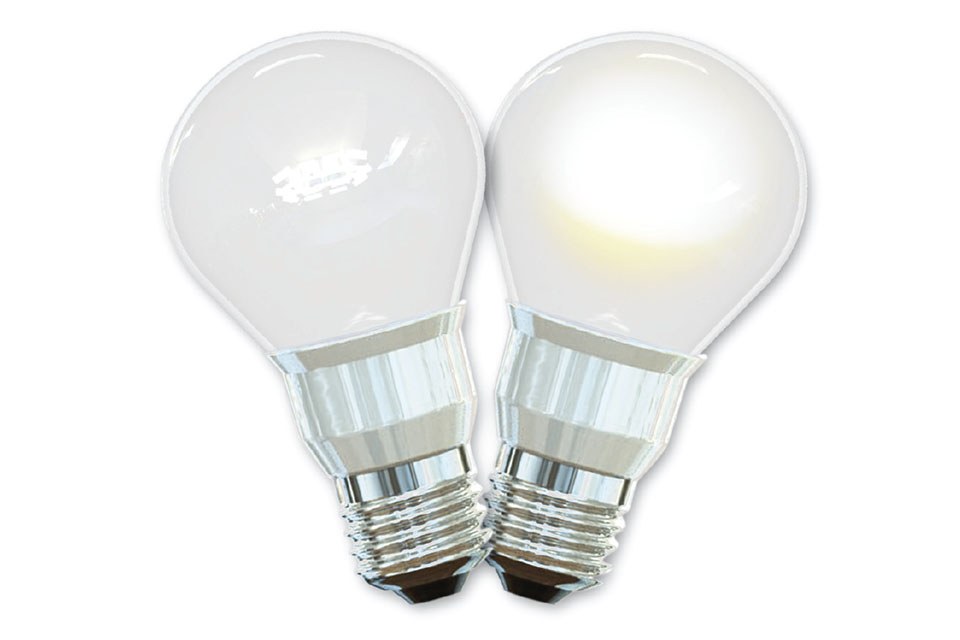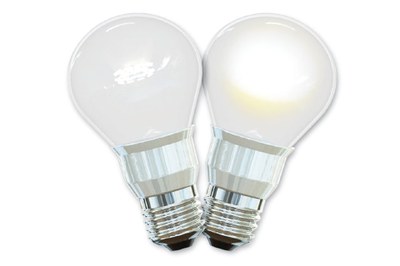Bayer's Polycarbonate Facilitated PolyBrite to Develop Award-Winning Bulb
If every American home replaced just one light bulb with a light bulb that's earned the Energy Star, it would save enough energy to light 3 million homes for a year, save about $600 million in annual energy costs, and prevent 9 billion pounds of greenhouse gas emissions per year – equivalent to those from about 800,000 cars – according to Energy Star.
Although LED products are currently available to consumers, the lighting market has a strong need for LED light bulbs that have the same appearance and light output as the bulbs they are replacing. PolyBrite International, Inc.’s Borealis® A19-40 LED light bulb meets these criteria, and also fulfills the product requirements for Energy Star Integral LED Lamps: 40 Watt equivalent, 62LPW.
The socket of the Borealis A19 LED bulb looks like a traditional Edison socket; and therefore, can be used in any lighting fixture that accepts standard Edison screw-based bulbs. To achieve this, PolyBrite needed a polymeric material compliant with Underwriters Laboratories’ (UL) mechanical, electrical and thermal product standards. The material used to form the A19 LED bulb also needed to deliver maximum transmission and adjustable levels of diffusion depending on the application. Makrolon 6717 polycarbonate resin meets these requirements.
According to Kevin Dunay, market segment leader, Electrical/Electronics (EE) Polycarbonates, Bayer MaterialScience LLC, this specific Makrolon grade was chosen for its clarity, durability, high heat resistance, UL 94 V-0 rating at 2 mm and ability to be matched into a translucent white/diffused color. “Bayer offers many grades of polycarbonate for use in LED applications, but Makrolon 6717 plastic worked particularly well for this specific product.”
Designed for indoor use in residential, commercial, hospitality and retail applications, the Borealis A19 light bulb uses a patented thermal dissipation scheme. This elevated LED concept allows PolyBrite to eliminate the bulky heat sink and create an A19 bulb that looks and performs like its incandescent predecessor.
“Bayer’s polycarbonate helped us to create the LED bulb that we envisioned, and their technical support ensured that we selected the proper grade to fulfill the requirements of our product,” said Carl Scianna, president & CEO, PolyBrite International, Inc. In addition to its material, Bayer also provided extensive color matching to deliver the correct amount of light diffusion.
According to Scianna, “PolyBrite had an excellent experience working with Bayer. We consider Bayer to be a great collaborator that was interested in meeting our needs through innovation, delivery and responsiveness.”
Scianna also pointed out that Bayer’s support contributed to PolyBrite achieving its goal of creating a product that can be used in today’s lighting fixtures, while substantially decreasing energy use and costs associated with frequent bulb replacement.
At 4.3-inches long with a 2.4-inch diameter, the Borealis A19-40 LED lamp consumes 90 percent less energy than traditional incandescent lighting, according to PolyBrite, and provides at least 50,000 hours of operation. This is equivalent to 23 years of use ¬– compared with three years of useful life for compact fluorescent lamps and nearly twice the life span of the Borealis A19’s rivals.
Its innovative design and outstanding energy savings led the Borealis A19-40 bulb to win the prestigious Chicago Innovation Award in 2012.
The product’s energy savings were put to use in fall 2012 when 9,500 Borealis LED light bulbs were installed in 164 homes in the Oak Park Neighborhood at Knox Hills in Fort Knox, Ky. PolyBrite International and Lend Lease, a leader in public-private community development, partnered to convert the neighborhood into what they believe to be the largest residential LED community in the world. The organizations estimate that the neighborhood will realize a total savings of more than $859,000 and reduce energy use by 2,612,500 kWh over the 22.8 year-life span of the LED bulbs in this application.
For more information about Bayer MaterialScience LLC's polycarbonates for LEDs, call 1-800-662-2927, email pcinfo@bayer.com or visit www.bmsnafta.com.
For more information about PolyBrite’s Borealis brand of products, call 1-800-320-3801, or visit www.polybrite.com or www.borealislighting.com.
About Bayer MaterialScience LLC:
Bayer MaterialScience LLC is one of the leading producers of polymers and high-performance plastics in North America and is part of the global Bayer MaterialScience business with approximately 14,800 employees at 30 production sites around the world and 2011 sales of 10.8 billion euros. Bayer MaterialScience’s 2011 sales in North America were $2.9 billion. The company manufactures high-tech polymer materials and develops innovative solutions for products used in many areas of daily life. The main segments served are the automotive, electrical and electronics, construction, medical, and sports and leisure industries. Sustainability is central to Bayer MaterialScience LLC’s business and is based around the key areas of innovation, product stewardship, excellence in corporate management, social responsibility and respect for the environment.
About PolyBrite International, Inc.:
PolyBrite International, Inc. has established itself as an innovative global LED lighting technology company since 1995. PolyBrite’s 17 years of experience in designing and manufacturing LED light bulbs and fixtures across a wide range of product lines has given PolyBrite a unique insight into the needs of the marketplace and the demands of consumers who are looking to LEDs for energy and maintenance savings solutions. PolyBrite designs, engineers, and maintains complete control in manufacturing solid-state lighting products, creating LED lamps, Street Lighting, Panel and Tube Lighting and complete Signage lighting systems under its Borealis® brand name. The Borealis brand of LED products utilize PolyBrite’s proprietary technology, circuitry and heat sink design, polymer lens technology, and overall design philosophy to bring energy efficiency, environmental sustainability and economic advantages of LED technology to the marketplace. PolyBrite’s goal has been to provide a product that can seamlessly be integrated in a customer’s current system while substantially decreasing their energy use and maintenance costs.


